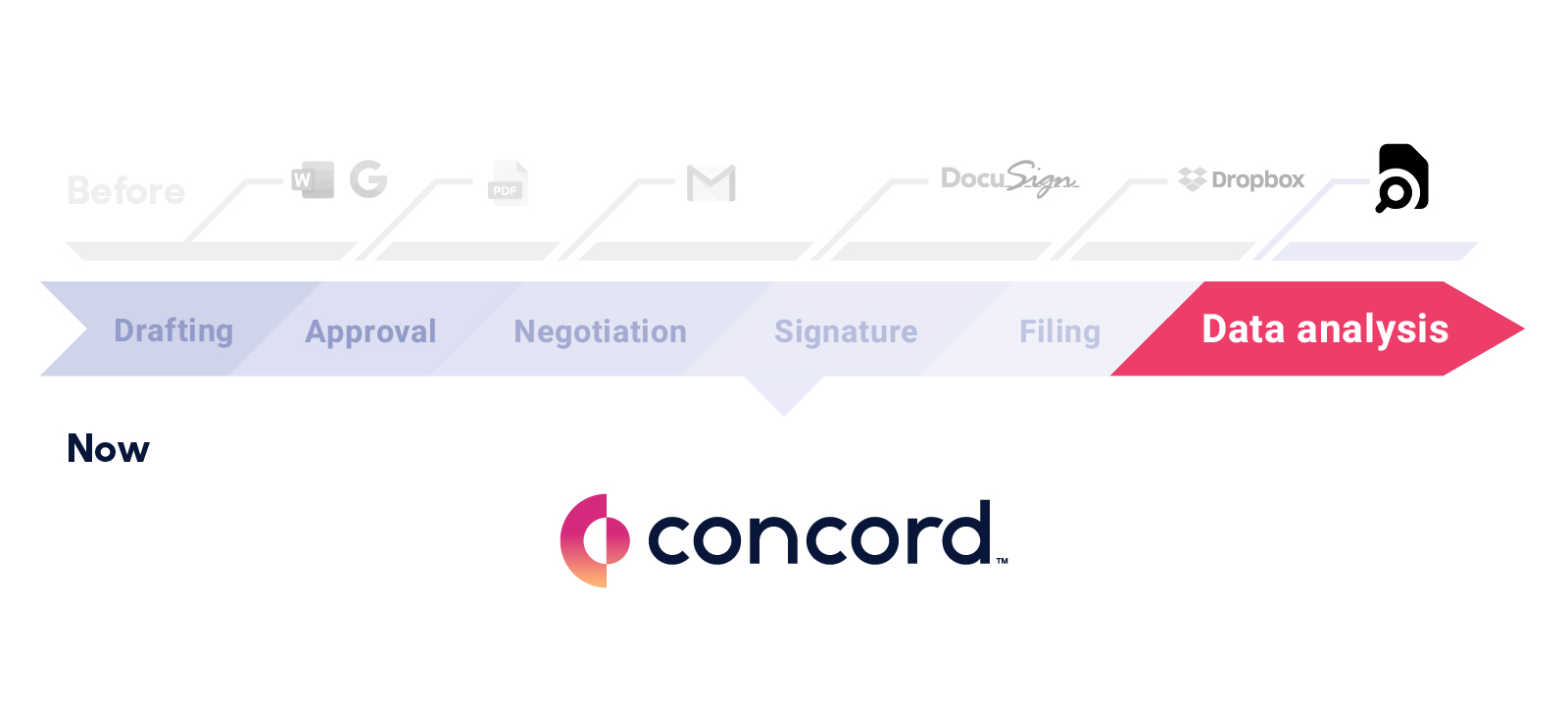Step 6 of the Agreement Lifecycle: Contract Renewal Tracking
Table of contents
- What are the Basics of Deadline and Renewal Tracking?
- The Cost of Poor Deadline Tracking
- Current Common Methods for Contract Renewal Tracking
- Tips for Better Deadline Management
- How Concord Contract Management Software Tracks Deadlines Best
- Conclusion
-
About Concord
Effortless contract management, from drafting to e-signing and beyond. Book a live demo to see Concord in action.
Book a demo
Missing a contract renewal is a bummer. But missing a deadline for a costly contract? That’s next-level disappointment. What’s more, it also opens the door to risk.
Contract renewal and contract deadline tracking are part of every business operation. Along with most businesses today, you likely subscribe to many services that help you automate common operations.
But, if you manually track contracts, or set reminders via disconnected tools, you’re costing your business revenue and opportunities. Let’s look at better ways to track deadlines.
Forbes advises that missed deadlines are many times the result of an organization “outgrowing” its systems. Instead, no matter the volume of contracts, here’s how to manage renewals and deadlines for better operations—and cost efficiency.
What are the Basics of Deadline and Renewal Tracking?
Contract renewal and deadline tracking involves monitoring when a contract is set for expiration, automatic renewal, or manual renewal. Moreover, contracts can have renewal terms for the agreement as a whole, as well as for certain sections within the agreement.
Where is Contract Renewal and Contract Tracking in the Contract Lifecycle?
Tracking deadlines and renewals is the 6th step in the contract lifecycle process. Here are in-depth articles on every step of the cycle.
- Drafting a Contract
- Internal Approval of the Agreement
- Contract Negotiation
- Signing the Contract
- Securely Storing the Agreement
- Tracking Contracts and Documents

What Expiration Terms Are Typical?
Just like you’d renew a healthcare or insurance policy in your personal affairs, a business contract can have varied terms. These can be set for a period, such as a year, financial quarter, or timeframe in which one or more parties can act.
For instance, you might have 90 days to dispute a purchase, or make a change to an agreement. Or risk waiting a year until the agreement expires. You’ll find these in SLAs, Offers of Employment, or Building Lease Agreements.
| Do you need to draw-up a contract and don’t know how to start? Concord provides free templates for some of the most common agreements. Visit our Template Center to get started! |
On the whole, your business will generally track expiration terms in sales, HR, and operating costs.
For instance:
- How many procurement contracts expire in a certain period?
- When are employee benefits up for renewal?
- What large vendor contracts are set to expire?
Opt for Automatic Contract Renewal Terms for Business Operation
Renewal terms in a contract are automatically renewed for a certain period, until one or more parties initiates a change in terms. This is not optimal for large, cost-sensitive contracts, but for more daily operations. It’s also a better option for avoiding risk if a deadline is missed.
According to JD Supra, these types of terms can open the door to more lawsuits. They vary in requirements from state-to-state.
Use automatic renewal terms for internal operating contracts:
- Building insurance
- Liability insurance
- Subscription services for business operations
- For employee perks, such as gym memberships
The Best Contract Options for Manual Renewals
For key client, procurement, or vendor contracts with large business and cost implications, manual renewals may be best. These are contracts that are highly valuable in cost, and operations. Any large sales contract, or partnership endeavor is naturally important to track and negotiate if expiration terms are in place.
The Cost of Poor Deadline Tracking
We don’t want to harp on the point that missing an important deadline feels (really) bad! But it’s really bad for your business—in ways that aren’t always so immediate or direct:
- Increased Risk
- Loss of Revenue
- Decreased Leverage
- Missed business
Statista found that in 2021, business interruptions are one of the top risks. That not only includes product and service delivery, but any interruption that impedes operations.
Likewise, have you ever had a client contract that was up for a renewal, and found the whole team scrambling? You decrease your leverage when you don’t allow time to review terms, costs, and possible renegotiation opportunities. Not only that, you may miss out on better opportunities.
Or, how about service agreements for your entire organization that automatically renew, so you’re left paying thousands for unsatisfying services?
Concord’s contract lifecycle management software meets these needs. So you’re not faced with what are unfortunately common scenarios.
With Concord you can:
- Set deadline notification as far in advance as you prefer
- Notify key stakeholders
- Set notifications for any clause or term in your contract.
Current Common Methods for Contract Renewal Tracking
For many organizations, it’s common for contracts to be disconnected, and tracked according to department or contract type. You might be so used to using these free, disconnected tools, the habit no longer meets the need.
Contract lifecycle management is a more recent comer (in the last decade or so) to the subscriptions service space.
As a result, businesses continue to use systems and tools that aren’t meant to maximize contract management:
- Spreadsheets Don’t Scale – Most businesses use spreadsheets, then set reminders on calendars, and collaborate by email. With a high volume of contracts, over time, this is an unwieldy system, which leaves rooms for missed deadlines.
- Calendar Notifications Limit Management – Are you plugging in all of your contracts for deadlines tracking and notification on calendars? Again, this process can get messy, and inaccurate, particularly if you have a high volume of contracts! You’ll also need to track the status, and organize where you’re storing contact versions.
- Organizational Software Isn’t a One-Stop Solution – It feels great to work in a well-designed subscription software like Asana, Trello, or Monday. While these tools help manage storage, and notifications for deadlines, they don’t allow you to collaborate as securely and easily.
Solve Contract Renewals and Deadlines with CLM Software
CLM software may not be as well-known as the electronic signature tools most businesses have adopted. Contracts are some of the most valuable business assets, and it just makes sense to use software that’s designed for contract security, collaboration, and every contract support feature.
Concord’s contract management software solves deadline reminders, as well as storage, reporting, editing, and sharing needs.
Tips for Better Deadline Management
If you need to manage your contract renewals and deadlines without dedicated contract lifecycle software, here are some tips.
Manual Contract Renewal Tips:
- Name your contracts and documents strategically. You want to make it as easy as possible to see key data about your documents at a glance. Consider a naming structure that includes the deadline or creation date.
- Plan your storage folders for deadline tracking. If you’re storing contracts in a cloud-based repository, this is crucial. Folders can be used to manage access permissions, but you can also structure them to support deadline tracking. Consider using subfolders based on due dates to quickly see what’s expiring soon.
- Maintain a spreadsheet that tracks all documents, location, due date, and responsible party. As we said above, this can get unwieldy. However, it can be a good solution in the short-term. If you decide to switch to a CLM platform, having a master list will be helpful.
- Train staff regularly and conduct periodic audits. Unfortunately, even the best systems can deteriorate over time. Periodically reminding staff of the contract tracking protocol helps with organization. Additionally, you will need to conduct audits of contracts at regular intervals to assure the system is working and you don’t miss deadlines.
- Break up knowledge silos about the contract tracking process. The last thing you want is to have only one person who can find or understand document management at the business. If something happens to that person, risk and revenue loss are likely. Make sure multiple people know how to access documents, or at the very least, make sure there is documentation of the process.
Manual contract renewal systems, or even those automated with different apps, require a lot of attention. Following the tips above can safeguard the operation a bit from human error and disorganization.
But what if there’s a better way?
How Concord Contract Management Software Tracks Deadlines Best
With Concord, you can opt with a subscription that works for your business and volume.
Concord’s service provides renewal and deadline tracking notifications for any term, or clause you set, and it also lets you notify the right people. You decide your tracking timeline, and what information you want to track. Sort any contract, in any way you need, with search filters by date, vendor, type or even clause.
What’s more, you can also report on these deadline terms, to make better business decisions. Finally, you can collaborate and negotiate internally in the contract software. So, you can review your considerations and compare these over time, for trends, and against reports, and other business information.
Not only that, because it’s based on Google Drive design, Concord’s easy to use. That makes it easiest for anyone on your team to adopt!
| See How to Best Manage Your Documents, Better, with Concord’s Contract Management Platform: Document Best Practices Video |
Conclusion
Your contract deadline and contract renewal terms are two of the most important aspects of whether your business runs well, or even fails. If you want to be on top of your business operations, start with better contract management.








